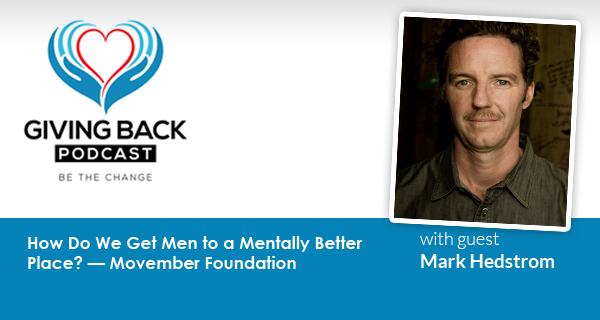Of the 41,000 Americans that committed suicide in 2014 — 75% were men.
Every year in November, men grow out their ridiculously good (and sometimes awful) mustaches to bring awareness to men’s physical and mental health. The Movember Foundation tackles three key areas — prostate cancer, testicular cancer, and men’s mental health with an emphasis on suicide prevention. Mark Hedstrom is the Senior Vice president of the Movember Foundation and talks on how the foundation is helping men’s health issues on this week’s episode.
Key Takeaways:
[1:05] Can you start a movement with just facial hair? [2:55] What is the Movember Foundation about? [4:25] Movember is in 24 countries around the world and the foundation has raised around 720 million US dollars in the 13 years that they’ve been around. [6:20] Men who participate in Movember are surprised by the kinds of conversations that get started. [6:50] What types of causes does some of the Movember donation money go to? [7:05] Prostate cancer is the 2nd most common form of cancer amongst men. [7:08] In the US — 220,000 men are diagnosed with prostate cancer every year. However, around 30,000 men die every year from the disease.[8:25] If you’re in your late 30’s, you should begin getting checkups for prostate cancer. [9:10] Although testicular cancer is a lot more curable than prostate, younger men from the ages of 18-34 tend to get this disease. These men often aren’t even thinking of their health at that age. [9:35] In 2006, the Movember Foundation branched out from cancer research and is now investing in boy’s and men’s mental health initiatives. [10:05] On a global scale, half a million men take their lives each year. [10:10] In the US — 41,000 Americans took their lives in 2014 and 75% of those were men (Centers for Disease Control). [11:35] Movember’s focus is on early intervention across all 3 fronts. [13:15] Mark shares some of the success stories of the men the foundation has helped. [18:20] Mark has been with Movember for over 4 years. [22:25] Men tend to have deeper conversations when they’re working shoulder-to-shoulder on a task — like fixing a car. [25:30] Raising money is important, but having the discussion about these important issues can save lives.
Mentioned in This Episode:






